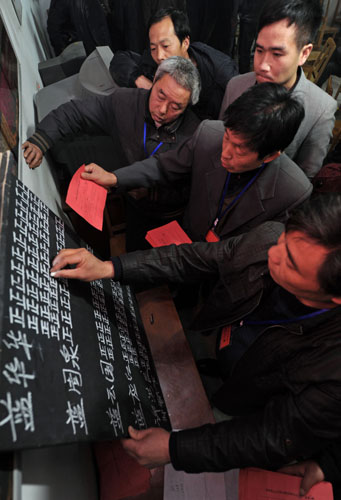Government and Policy
Supervisory committees boost rural democracy
By Yan Jie (China Daily)
Updated: 2011-04-09 08:46
 |
Large Medium Small |
|
 Village representatives supervise the counting of votes won by the candidates for a village committee in Bei'er village administered by Quzhou city, Zhejiang province, in mid-March. [Photo/Xinhua] |
In East China's Zhejiang province, the birthplace of the supervisory committees, the village-level watchdog of local affairs has existed in all of the more than 30,000 villages since 2009, according to the provincial discipline inspection commission.
The committees must give priority to supervising events that raise villagers' concern, said Zhao Hongzhu, Party secretary of Zhejiang province and a key advocate of the committees since their birth.
The province will try to improve the practice and beef up the supervisory effect of the committees, Zhao said.
It was no surprise that the village-level watchdog gained its first foothold in Zhejiang, experts said.
Due to the thriving privately run companies, Zhejiang was one of the first provinces to experience the prosperity that came after China's economic reform and opening-up.
The rise of Zhejiang's economy led to the rapid growth of the collective wealth of its villages.
Village officials, such as the village Party secretary and the director of the village administrative committee, are entrusted with managing most of the villagers' collective wealth.
But there was insufficient oversight of village officials before the supervisory committees were introduced, according to the provincial discipline authority.
Villagers were becoming increasingly aware of their rights, including having a voice in the use of village funds, while the village officials thought they had the final say, which often set off disputes, sometimes even clashes.
The resolution came from a small village called Houchen in the province's Wuyi county in early 2004. Villages had voted to elect a five-man group to supervise the village's finances, creating the predecessor of the current village affairs supervisory committee, said Zhang Weibin, a senior official of the provincial discipline inspection commission.
Six years after Wuyi county established such committees, the province mandated them by law in July 2010, said Zhang.
Under the law, all supervisory committee members are to be elected by a vote of the villagers or the village congress.
And the committee has to ensure that all economic events are made public. Every key decision for the village must gain approval before enforcement.
In addition, committee members can be sacked by the no-confidence vote of villagers.
The supervisory committees have been helpful in reducing conflicts in villages, according to the provincial discipline authority.
In 2009, discipline authorities saw a 6.71 percent drop in petitions against village officials, and in 2010, a 15.5 percent decrease, provincial discipline authorities said.
"Before the introduction of the supervisory committee, we had only half completed democracy in villages," said Zhang.
Its establishment has brought an end to the situation that the village secretaries and the village committee directors were both participants and referees of village affairs, he added.